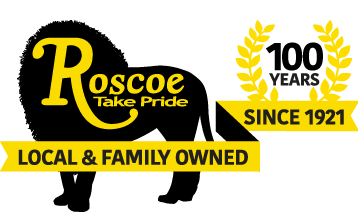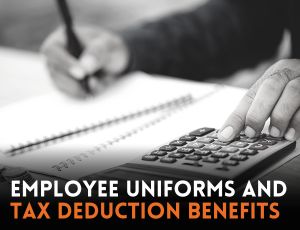Another tax season has fallen upon Chicago, and you no doubt have many questions about what expenses can and cannot be deducted from your company’s taxes this year – such as employee uniforms.
Investing in employee uniforms is a significant expense for companies, yet there is a lot of gray area when exploring whether or not this expense can be deducted from your taxes. Every company’s tax situation is different, and it is ALWAYS recommended to consult with a tax professional when seeking help with company taxes.
To get you started in your research, we’ve put together an overview of what employee uniform & clothing expenses can and cannot be deducted.
What Can Be Deducted?
According to the IRS, “a business expense must be both ordinary and necessary.”
- Ordinary expense – “is one that is common and accepted in your industry.”
- Necessary expense – “one that is helpful and appropriate for your trade or business.”
If a business expense is deductible, it means the business is able to subtract the expense from its taxable income, which will reduce the amount of taxes owed.
Uniforms That Are Tax Deductible
When purchasing uniforms for your employees, the expense is tax deductible if the garments are both distinctive (such as branded with your company logo) and unsuitable for everyday wear. The cost of upkeep (laundering, etc.) for these uniforms is also tax deductible.
The following types of uniforms and PPE garments required for workers are often considered to be tax deductible.
Safety Uniforms
In many industries, safety garments are required by law to be worn by employees when on the job site. These garments include FR Uniforms, High visibility and enhanced visibility garments, food processing uniforms, and lab coats. All of the required garments listed above are tax deductible.
Other Required Uniforms
As mentioned above, uniforms are tax deductible if they are unsuitable for everyday wear. This often includes industrial uniforms like coveralls and heavy-duty work shirts/pants that are worn only when required and in order to perform a job.
In addition, garments branded with your company logo are considered to be “distinctive” and are also tax deductible. Garments that pass for everyday wear, such as a regular, unbranded t-shirt or a pair of denim jeans, are not generally considered to be tax deductible.
Promotional
Who doesn’t love free stuff?! Oftentimes businesses will give away company “swag” to prospects & employees. Purchased garments embellished with the company logo can also be tax deductible if the company is strictly giving them away and not selling them. This is because they are considered to be an advertising expense.
What Is NOT Tax Deductible
We’ve already covered some instances where uniforms are NOT tax-deductible, such as, if the garment is suitable for everyday wear. This is the best rule of thumb to stick to when determining what garments are and are not tax deductible. It is also important to note that some garments specifically designed for work (such as heavy-duty industrial workwear) are not always tax-deductible if they are not branded with a company logo.
What You Need To Make A Claim
Last but certainly not least, it is essential that you keep any and all receipts you received from employee uniform purchases if you want to claim a deduction on your yearly taxes.
Companies must keep thorough records of garment expenses and their work-related use percentage. When it comes time to file taxes, your claims will need to be supported by this evidence.
Filing yearly taxes is almost never a straightforward or “easy” process. Consulting with a tax professional and understanding what major expenses are deductible is worthwhile as it helps to relieve the company’s tax burden.
Ready to make the switch to a local, family-owned uniform rental provider that truly cares about helping your company succeed? Contact our Roscoe team today!

